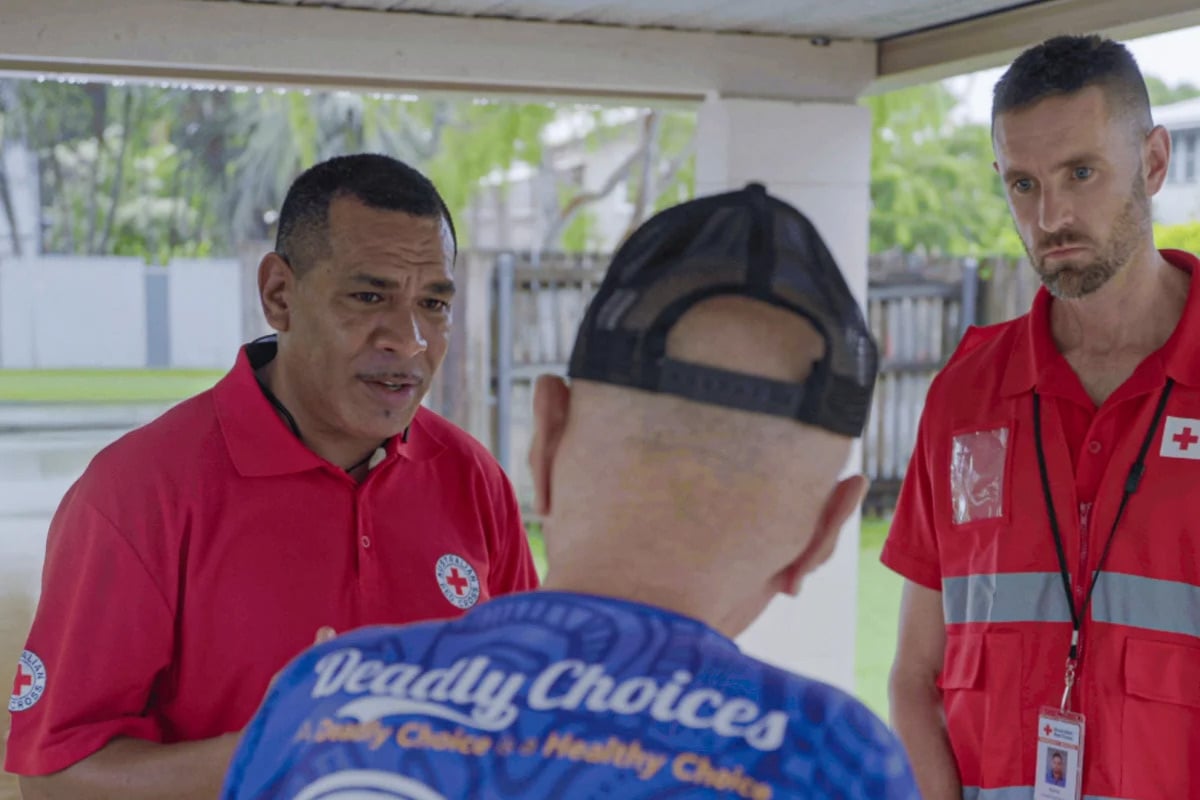Serving communities with care
Recovery after a disaster is about more than rebuilding – it involves restoring hope, stability, and emotional resilience.
In the devastating 2019 Townsville floods, Aboriginal elder Hans lost everything. The rising waters submerged his home and swallowed his belongings.
“I lost everything. The car, the TV, the beds, clothes, photographs,” Hans recalls. When police and the army arrived to evacuate residents, Hans and his son had no choice but to leave with just the clothes on their backs. “I didn’t know what to do, I felt terrible,” he said.
As the floodwaters subsided, Hans stayed with his grandson while the long, arduous clean-up began. It took weeks to fully understand the extent of the damage. His home was ruined, and the emotional toll was just as overwhelming. The loss of his personal and cultural belongings weighed heavily on him. But amid the destruction, a knock on the door signalled the start of his recovery journey—Australian Red Cross team members had arrived.
Sam Savage, an Australian Red Cross team member, was part of the team that reached out to Hans. “We recognised that there were community elders from our local region in the impacted zones,” explains Sam. “Once we heard about the damage, we went over to provide outreach and support—knocking on doors to check on the local's psychosocial welfare after their experiences and then began the process of referrals to the necessary services.”
Hans’ experience was not unique—many in his community had been deeply affected. Some had lost everything, while others had been impacted in different ways. Australian Red Cross volunteers went door-to-door, listening to people’s stories, offering emotional support, and connecting them to the right services. “Some people might have been fully impacted, other people not so much. Our volunteers go out, assess, and either refer people to different support services or just have a general chat, about their recovery journey and where we can support them,” says Sam.
For Hans, that moment of connection was invaluable. “Red Cross has done a lot of good things for our community,” he says. “Growing up, I’ve always had it really tough in my life, but I’m very proud of you people. I love what Red Cross do.”
The psychological impact of the 2019 floods lingered for years. Hans continued to struggle with anxiety, particularly when the skies darkened, and storms loomed. “Twice since the 2019 floods, I’ve felt triggered—scared it was going to happen again,” he shares.
Each time, he packed his things and left to stay with family on higher ground. The fear of losing everything again was ever-present.
Sam and his team at Australian Red Cross understood this fear all too well. “A lot of people did start to panic and really think about, do I have to leave my home again? Have I got an emergency kit ready? Have I got the essential items that I need to take to survive for those certain days? Will my house get flooded again?’” Sam says.

Recognising these anxieties, Australian Red Cross team members maintained their presence in the community, offering ongoing support and helping residents prepare for future disasters. “Uncle Hans had reconnected with the Australian Red Cross when he needed emotional support, after being triggered by another weather event. We're offering different support services that we can link him into and reconnecting him to trying to get back to a normal life as possible,” Sam explains.
In early 2025, when another Cyclone Alfred threatened Townsville, Hans wasn’t alone. Australian Red Cross team members returned to help people prepare and reassure them.
“The benefits of having Australian Red Cross volunteers come to your house is being able to talk your story through. The volunteers are able to deeply listen,” Sam explains. “We can put in place measures to connect Uncle Hans to other support networks that may be required for his recovery journey.”
For Hans, this support made all the difference. “Red Cross have done a lot of good things for our community,” he says. Though the fear of flooding remains, he knows he doesn’t have to face it alone. Each time a storm rolls in, he has a plan, and he has people he can turn to.
For Sam and his fellow team members, that’s exactly why they do what they do. “It's a marathon. It is not a sprint. We are going to be here for the long haul.”
Support people before, during and after disasters
Red Cross pays our respects to the Aboriginal and Torres Strait Islander custodians of the country where we work, and to Elders, past, present and emerging.
Learn about our Reconciliation Action Plan and how we can all make reconciliation real.
This website may contain the images, voices or names of people who have passed away.
